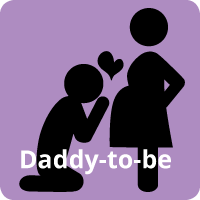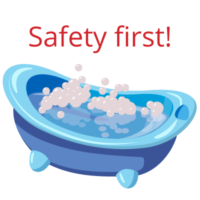Your wife is pregnant with your first child and you want to be the best father and husband ever, but you have no direct experience taking care of babies. So, what can you do? How can you help your wife and also be a proactive father?
After receiving the news that your wife is expecting your first baby, you may have a lot of concerns. Although it may be up to nine months before the baby arrives, you can start preparing for the event right now.
Preparing yourself. Sign up for prenatal classes together with your wife and read books together to guide you through your first experience as a father. Chat with experienced parents, such as your family members and childbirth educators if you have concerns. Prepare a todo list and pack a bag ready with the essentials for when the time of birth comes. Plan where to deliver the baby and map the best routes to the hospital, considering the traffic condition. If you are feeling stressed or anxious, talk to your wife about it, as she is the one carrying the baby! Sharing your concerns also helps to better understand and provide support for each other.
Helping your wife. Pregnant women experience a variety of emotions due to fluctuating hormones. Help your wife cope with her physical and mental changes by listening to her and reassuring her. As her pregnancy progresses, it will be more challenging for her to move around, so help her with the chores and do your best to attend to her requests. This experience also prepares you for a life with a young child, in both your lives and this period is an excellent training opportunity.
Home sweet home. Set up your child’s bed. Get the necessary equipment for your baby, like a baby carrier or a stroller. Invest in a quality baby car seat for safe travelling. Baby-proofing your house can be done at later stages when your child is about to crawl and walk. Take a step-by-step approach and don’t rush to prepare everything as the cost can add up fast.
Money matters. This is a good time to reconsider both your financial habits, factoring your child into the equation. Having a child can be expensive, so have an open and honest discussion with your wife about finances. You may want to give the best for your child, but keep in mind that babies outgrow their necessities, like clothes, very quickly. Consider having a family health insurance plan and setting up an education fund for your baby with your yearly bonus. You may start small at first, but the key is to start early as things like insurance and an education fund will cost more the older the child gets.
Quit smoking. Take steps to stop smoking even before your baby is born. Seek help through a smoking cessation programme (e.g. JomQuit). If you are unable to quit completely, never smoke in the presence of your pregnant wife or baby. Also, change your clothes after smoking, as third-hand smoke can stick onto the fabric. Babies who breathe in others’ cigarette smoke are more likely to have ear infections, frequent asthma attacks, and to die from Sudden Infant Death Syndrome (SIDS). You owe it not only to your child, but most importantly to yourself to quit as you want to be around to see your child grow up, don’t you?
A new-born baby is very sensitive and has a lot of needs. Your wife, who has just given birth, is still weak. As the father, you will need to be able to take care of your baby too. This is the time to practice what you have learnt. Parenting is a team effort and you should not let your wife manage the baby on her own.
Holding baby. This might sound either easy or scary to some men, but it is an important part of parenting and establishes a bond between you and your baby. When picking up and holding your baby, carefully support his head and neck. More importantly, never carry hot or sharp objects while holding your baby, and hold him with both hands when going up or down the stairs.
Bathing time. Bathing 2-3 times a week is enough to keep new-borns clean. If he likes bathing, once a day will do. Bathing him for too long or too often can dry out his skin. You can start giving him a tub bath after the umbilical cord falls off. Use mild baby soap if necessary.
Changing diapers. Dealing with dirty diapers is part of being parents. Babies need frequent diaper changes, depending on how often they poo or wee, and how sensitive their skin is. They can get diaper rash if a full diaper is left on for too long.
Feeding baby. For the first six months, your wife is recommended to exclusively breastfeed your baby, but you can help by offering to burp him after he is done. If your wife expressed her milk, you can let her rest by helping to bottle-feed your baby. Learn to thaw and warm up expressed breast milk and how to wash and install the breast pump. When your baby starts on complementary foods, take turns to prepare food and feed him.
The right-hand man. Giving birth takes a lot of effort and your wife is going to need some time to recuperate. She might be able to manage the baby, but your contribution to help with house chores will be very much appreciated. Be attentive to her needs, such as giving massages or bringing water while she breastfeeds. Good communication between you and your wife is important, especially on how things should be done.
Being a dad for the first time can be daunting. There are a lot of new things to learn and more things to do. Apart from that, you might have less private time with your wife. However, it is the quality of time spent with your family that matters. With teamwork, your journey into parenthood will be a blissful and meaningful one.
Always fill the tub with cold water first, then hot water, and mix it well to prevent scalding. Test the water using the wrist or elbow. Also, never leave your baby unattended as babies can drown in 2 inches (about 5 cm) of water. Carry him along if you need to grab a towel or answer the phone.










Comments